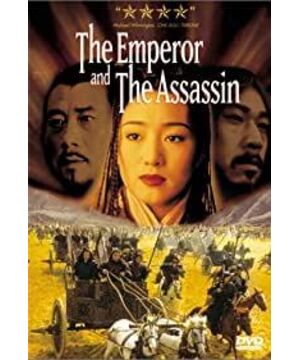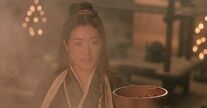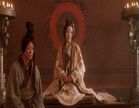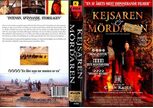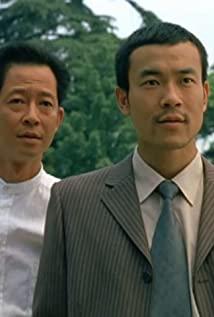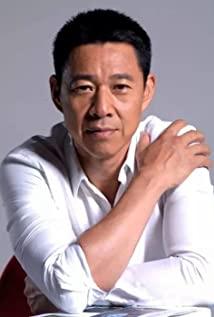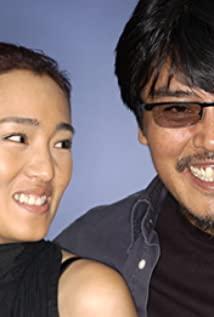"Jing Ke Assassinating the King of Qin" is not Chen Kaige's best movie, nor is it the worst. Compared with "Farewell My Concubine" in its peak period, this film can be said to satisfy Director Chen's strong desire for expression, and it also carries more private goods. It feels crazy and absurd, and the lines are also Chen Dao's consistent ungrounded, non-linear narrative technique, which breaks the logic of the narrative in telling the story and raises the viewing threshold compared to "Farewell My Concubine". It didn't seem so pleasant.
When watching a movie, the barrage keeps saying that it doesn’t respect historical facts and that the movie is not a documentary. It’s not embarrassing for a director with a particularly strong desire to express himself to write a biography honestly. The first commentary in my life, send For "Jing Ke Assassinates the King of Qin".
There is no logic in this film review, it just satisfies my personal desire for expression, and I will talk about one of the fifth-generation directors who have the heaviest filters.
1. King Qin - a victim of lofty ideals
"Jing Ke's Assassination of the King of Qin" tells the story of King Qin's political unification of the six kingdoms. As the first emperor in history to unify the six kingdoms, the people of the country have always been controversial and emotional about this first emperor. From the point of view of modern people, the unification of the six kingdoms by the King of Qin is a historical necessity, and the world must be divided for a long time. Therefore, when we look at this character with filters and imagination, it is different from the description of the king of Qin in conventional historical biography, either tyranny or justice. "Jing Ke thorns the king of Qin" fully endows this historical figure with human emotions, and tells about him How to become an emperor from a man, how to become crazy. This questioning of lofty ideals is also a distinctive feature of Chen Kaige's films.
The process from King Qin to Emperor Qin Shi Huang was a process in which Qin Wangzheng gradually lost human feelings. At the beginning of the movie, a voice-over came, "Ying Zheng, do you still remember the ideal of the previous king to unify the six kingdoms?" This voice-over runs through the whole movie, the unification of the six kingdoms was the grand ideal of the late king, and the King of Qin was this ideal. and live. For the sake of the whole ideal, the King of Qin changed from Zhao Zheng to Ying Zheng, and from Qin King to Shi Huang.
King Qin, who had just appeared, had a little innocence in his eyes. He punished Connie for his behavior and made him walk on high places, which was a bit like a prank by a child. If I don't play with His Majesty, he should be worried about me. Auntie called this punishment play. The interaction between King Qin and Nv Zhao was also like a game. Before Nv Zhao left Qin, they focused on games in their childhood. At this time, their childhood memories were pure and happy. In the movie, both Zhao Nv and Qin Wang's mother Zhao Ji always like to recall Qin Wang's childhood. In their stories, Qin Wang was innocent, kind and filial when he was a child.
At the beginning, King Qin was not so tyrannical. Yan Dan took his sword to the palace to kill him. Instead of killing Yan Dan, he told his ideals. The reason why he unified the six countries at this time was to make the six countries no longer have wars. , so that everyone, young and old, has something to depend on, but this ideal has also deteriorated in the end.
The first change came when he sent off Zhao Nv. Nv Zhao represents the innocence and kindness of the King Qin. He sent Nv Zhao to Yan Kingdom for his ideals, which means that he lost his innocence for the sake of ideals. In the later plots, King Qin never showed his innocent expression again. In addition to innocence, Nv Zhao also represents his nostalgia for Zhao State. Nv Zhao loves her motherland very much. She is a very noble character. She loves the motherland and the people. When the King of Qin sent her away, she was largely lost. Such innocence and love.
Although this kind of plot setting for the beloved woman to go to the assassin to kill her is a bit ridiculous, but for Director Chen, the plot is a woolen thread, and it will be done when the meaning is reached.
The change in the second step comes from the fact that King Qin broke through the adultery between Lao Su and Zhao Ji. Zhao Ji is the mother of King Qin. In Zhao Nv's story, King Qin was very filial to his mother when he was a child. Although there is not much ink in the movie, you can still see King Qin's feelings for his mother. When he knew that Ai and Zhao Ji had two more children, he ignored Zhao Ji's pleading and killed his two brothers. After losing his innocence, Qin Wangzheng lost his mother, and he gradually became a cold-blooded and ruthless king. As a son, he could leave half-brothers, but as a monarch, he could not leave any blood stains.
The climax of King Qin's human nature was the confrontation with Lu Buwei at the ancestral temple, which was also the source of a major criticism in "Jing Ke Assassinating the King of Qin", tampering with historical facts. In history, whether Qin Wangzheng's biological father was an alien or Lu Buwei, it didn't really matter. Lu Buwei was both a teacher and a father to the Qin King. Even if he was not the Qin King's biological father, his death could be regarded as a murder of his father. behavior. The King of Qin lost his father again for lofty ideals. In this section, I have to praise teacher Li Xuejian's performance. It's too tense. The kind of pulling and helplessness blows up.
As a major climax of the movie, there is one character that must be mentioned, that is, the book boy who has been following King Qin. This character uses an expressionist technique. The book boy is the figurative incarnation of lofty ideals. He has no emotions. Compared with the people in the movie, the book boy's makeup is pale and pale. It is the embodiment of lofty ideals, cold and rational, like a machine crushing human nature. When King Qin was emotionally pulled, he asked, "Ying Zheng, have you forgotten the wish of the previous king to unify the six kingdoms?" When King Qin had to kill his father, he was divided, and his human struggle was obliterated by lofty ideals , The last father and son warmth dissipated with Lu Buwei's suicide. From then on, Ying Zheng was no longer Ying Zheng, he was just a puppet pushed forward by the unified six kingdoms. In the end, when Jing Ke wanted to kill him, he asked Jing Ke, do you know what I want to do? I want to unify the six countries, and I want to make all the Qin people's eyes can see become the land of the Qin country. In the land of Qin, his ideals have deteriorated, and he has lost his original intention.
Two, the children
"Jing Ke's Assassination of the King of Qin" uses a paragraph to write about the children. This image is also very interesting. The children also run through the entire film. It is about change. Children, in the public perception, often mean innocence and hope, and this image is also very clearly expressed in the movie.
King Qin's change from Yingzheng to Qin Shihuang, he first lost the innocence of his children, and then slowly lost human emotions, love and kinship, and finally became a cold-blooded and ruthless king. And Jing Ke's change also comes from the children.
Jing Ke was a cold-blooded and ruthless killing machine in the beginning. He was fearless to live and die. His transformation came from the blind girl played by Zhou Xun. The blind girl committed suicide in front of him, which made him begin to fear death and gradually understand the value of human life. He didn't want to pick up the butcher knife and become a killer anymore, he started to have humanity. And his acquaintance with Zhao Nv was also because he saved a child. He gradually returned to his humanity as a killer, and finally went to justice in order to save the children of Yan country.
Children mean flames and hope. When Zhao State was destroyed, King Zhao imprisoned all the children of Handan in the palace and let the children die. In a sense, he cut off the hope of Zhao State. The children of the clan jumped off the city wall one by one, showing the blood of Zhao people and cutting off the hope of revenge. In the end, Qin Wangkeng killed all the children of Zhao State, buried the flames of Zhao State, and buried his last humanity.
Three, the father
I believe that Director Chen must have very deep feelings for his father. In "Jing Ke Assassinates the King of Qin", the mother's image is a little thin, but the father's image is very full. They may be powerless but willing to give everything for their children. The three fathers presented in the film, Ai Shu, Lu Buwei, and Jing Ke are all like this.
Let's talk about Laoyu first, this character appeared in the opening scene. He is sly and sophisticated, greedy for life and fear of death, just like a cunning villain. The change of Emu or the opportunity for him to usurp the throne is that the King of Qin saw his illegitimate son with Zhao Ji, and the usurpation of Concubine had a foreshadowing at the beginning. At the beginning, the confrontation between Emu, Zhao Ji and Lu Buwei, Emu said that I only know The queen mother didn't know your majesty. The second time was when Aiyu and Zhao Ji were playing with the children. He said that his children would hide in the deep palace for a lifetime.
The scene in which Ai Su brought his disciples to fight with the King of Qin's army was the highlight of this character. The soldiers in black armor and the disciples in linen were a one-sided massacre. The stark contrast made the fight even more tragic. If Auntie didn't have a relationship with Zhao Ji and had no illegitimate children, she should be able to live well with his sophistication.
The second father was Lu Buwei, and when the concubine was usurping the throne, he tried to win over Lu Buwei, but to no avail. The King of Qin was well prepared for Concubine's usurping the throne. On the one hand, it was due to his insight and the emperor's ingenuity, and on the other hand, it might also be due to Lu Buwei's whistle-blowing. Compared with the final climax, what I like most is the confrontation of the ancestral temple. The emotions of the characters are very well grasped, and the confrontation between the two old actors is completely blowing. Lu Buwei's sentence "a child will not kill his father" is impressive, and in the end he gave his life for his child's great cause. Before Lu Buwei was hanged, they still had a bit of father and son tenderness. With King Qin's execution of the nine clans, he was just an iron-blooded king from now on.
The last is Jing Ke. In terms of blood, Jing Ke has no children of his own, but his changes are all because of children, from Zhou Xun's blind girl who committed suicide, to saving Xiao Qi'er, and finally to prevent the children of Yan from being slaughtered , showing his fatherly side. He is the father of the old, the old and the old, the young, the young and the young. In a sense, he is more in line with the universal thought of Confucianism, and his sacrifice has become greater.
Forcing so much, I just want to express my praise to Director Chen. As the pioneer of the fifth generation of directors, Director Chen is a person who can never be avoided in Chinese film history (of course, there is a lot of controversy). Director Chen's films are gorgeous and romantic, and he always likes to carry private goods, so he is not very popular with audiences in the new era. After all, the movie-watching crowd has shifted to the post-8090s generation, and modern people are becoming more and more self-reliant. Compared with the romance of others, they may be more likely to see stories about expressing themselves.
View more about The Emperor and the Assassin reviews


